Copyright ©2009 PopEntertainment.com. All rights reserved.
Posted:
March 20, 2009.
When
veteran actor Nicolas Cage came to town to conduct a press conference for
Knowing, it was shortly before the sad and untimely death of Natasha
Richardson – an artist who will be sorely missed and whose death has to make
anyone think: who knows what fate has in store for us? If a different
decision had been made – to see a doctor right after her fall, for instance
– would she have survived?
Here is a film that makes us ponder such questions, posed in a complicated,
sometimes contradictory, fashion. By knowing what the future holds, and how
"fixed" it is – that it is somehow "preordained" – does knowing that just
enervate, or stimulate? This film raises a host of questions though it
doesn't necessarily solve them.
Without revealing the ending, Knowing starts as a tale about a boy,
Caleb Koestler (Chandler Canterbury), who finds a strange document with rows
of numbers which foretell a series of disasters stuffed into a time capsule
by a prescient, troubled girl (whose daughter becomes an adult named Diane,
who is played by Rose Byrne). The film evolves into a grandiose sci-fi story
that in some ways is far less satisfying than if it had been crafted with
more ambiguities and less grand vision.
Nonetheless, at a time when people are compelled to question what is "fate,"
what is "inevitable," what decisions can we control, and what ones are
beyond our power – this movie stirs such speculations as well. I leave it to
others to craft a review on the aesthetic merits of the film. But the film
was certainly cast with talented enough actors to convey Australian director
Alex Proyas's intentions (whose previous sci-fi/fantasy films include I
Robot, Dark City and The Crow). Anchored by Cage, who plays
quantum physicist John Koestler, supported by Byrne and young actor
Canterbury, the cast brings to life these characters reacting to the extreme
circumstances of the film.
Cage, of course, has become a master of making the impossible seem feasible,
and of realizing a character in strange situations reacting as any man
would. He is skilled at rendering such characters because of his own
fascination with such scenarios. Just look at his recent catalogue of films
that draw on a sense of wonder that make them
feasible: Next, Ghost Rider, or The Wicker Man.
Even while this film shows that disparate events can line up along some
lines based on probability theory or chaos theory, so did this press
conference, with a range of journos asking questions that were both on the
money and way off course. By applying, hopefully, a deft editorial scalpel,
this sprawling compilation of questions takes on some form and intent.
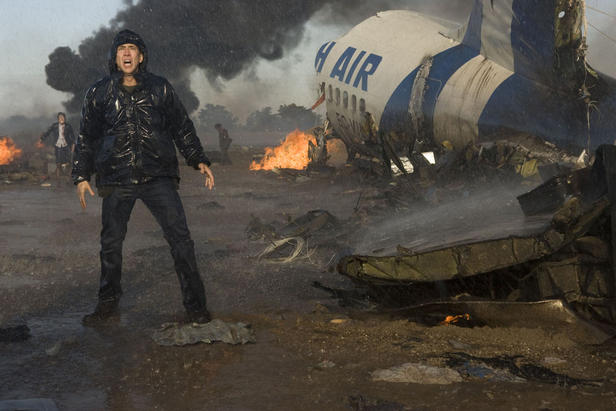 Why does the science fiction genre appeal to you?
Why does the science fiction genre appeal to you?
Well, good science fiction is intelligent. It asks big questions that are on
people's minds. It's not impossible. It has some sort of root in the
abstract. So automatically you're getting closer to potentially divine
sources of interest because it is abstract. It's one of the only ways that a
film actor can express himself in the abstract and have audiences still go
along for the ride. They don't contend it. They accept it, that they're
going to go places that are a bit more of the imagination, a bit more out
there, and that's more and more where I like to dance. The other thing is
that I got a little tired of movies where I had to shoot people. I got to
thinking about the power of film and what that power is. The power is in
fact that it really can change people's minds. I had that experience with
The China Syndrome. It made me aware. So I thought if it was this
powerful, the power to change people's minds, then perhaps I should just be
a little more responsible with that power. That's not to say that I don't
believe in freedom of speech. I do. It's just that at this point in my life;
in my interests I would rather entertain you with the spectacle and with the
imagination as opposed to servicing your blood lust appetites. But that's
not to say that I might not find myself in that situation again. There are
ways of doing it, even by showing it where it can be ironic, and there can
be awareness in that as well. Just not gratuitous in the sense that I want
you to get off by watching someone's head explode.
Did
you get into quantum physics to prepare for this role?
I grew up with a professor, so that was all the research that I really
needed. I just used my own recall of what that experience was like.
So you could relate from that experience, growing up with it?
Yeah.
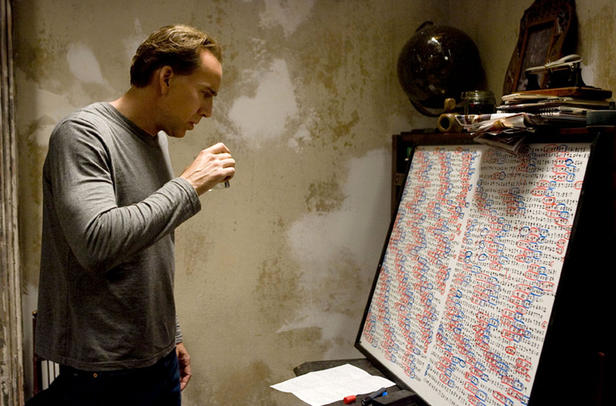 This is the second movie you've done where the future's been involved
(the other being Next). What's your interest in the future, or in
seeing the future? Do you think we have a predetermined future or is it all
randomness?
This is the second movie you've done where the future's been involved
(the other being Next). What's your interest in the future, or in
seeing the future? Do you think we have a predetermined future or is it all
randomness?
At the risk at impinging on your own personal opinions, or your own
relationship to the movie, I would just offer that I'm not a chaos theorist.
This film also deals with science versus fate. Is there room for both
phenomena on the same side of the coin or are they always going to be
diametrically opposed?
Again, without impending on your own personal choice, there are going to be
those that wear the hat of religion and those that wear the hat of science.
I still don't really understand why they can't wear both hats, because
personally, I think that they go beautifully together.
Even though the movie is about a possible end of the world, it's still a
positive film. The story shows how you need to live each day to the fullest.
Were you affected by the seeming moral of the story?
Well, first of all, any opinion I give is not as important as your opinion.
Your opinion is what matters to me and so if that's what you took from the
movie then that's absolutely correct. Any awakenings that I may have had
happened before I said yes to the movie. So I didn't really learn anything
or get anything from it, but I was just
ready to express it. I had gone through various thought processes at the
time the script came to me where I felt I was in sync with Alex [Proyas] and
with the story. It's one of those rare opportunities where I felt like the
filmmaker and myself were completely on the same page philosophically and in
terms of style.
Alex Proyas spoke of valuing the rehearsal process and insisting on it.
Does that help you as well? Did he allow for any improvisation or for you to
put your spin on things?
I generally enjoy the rehearsal process because that's where you can share
your ideas, get your thoughts and feelings out and see whether or not
they're going to land, whether or not people are going to agree with them,
particularly the director. So you can sort out in that process any elements
that need to be sorted out before you're on the set, and of course that
saves time and it also makes everyone more
comfortable working together. And yes, Alex is the sort of director that's
open to suggestions and makes you feel comfortable, relaxed enough to be
able to create. It's quite liberating and he was open to various ideas.
Can you expand on what you think is unique about Alex as a filmmaker?
Well, he has this enormous capacity to design shots and design FX in a way
where you know it's him that's doing it. They look beautiful. They're also
scary. Alex is an artist. He's an original and he can really make a movie
look beautifully designed in a way that has his signature. But having said
that, we both agreed that the [film] should be almost cinéma vérité,
that there should be almost a documentary style to the performances so that
it would make the experience more terrifying for you and perhaps more
visceral in some way. He's like a painter from any era of painting. He has
the same abilities. That's what I mean about him in that I think he's an
original voice. I don't feel like he's ever copying anyone else.
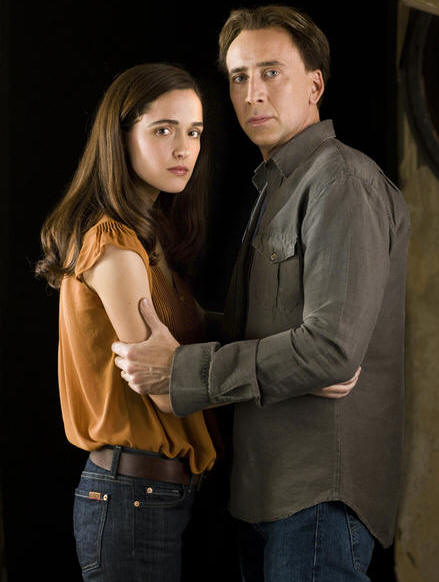 Five minutes after you meet Diana – Rose Byrne's character – there's
desperation in your relationship with her. Can you talk about that kind of
relationship in a film, of two characters who have a desperate need for each
other yet have to learn trust each other?
Five minutes after you meet Diana – Rose Byrne's character – there's
desperation in your relationship with her. Can you talk about that kind of
relationship in a film, of two characters who have a desperate need for each
other yet have to learn trust each other?
Well, that was the challenge: how do I convince this woman to go along with
me and to sort through what's happening in my life and in everyone's lives?
It was kind of awkward at first because I was trying to go around the scene
in different ways that would terrify her, and yet at the same time I had to
keep her with me. Now the thing is that Diana's mother had this calling and
this ability, and she was living with the curse, if you will, of feeling
that she was going to die on that particular date. So when I was able to
give her those numbers, that's what brought her back. But I didn't really
see how there was any way that I could get around it. I felt that at some
point early on in that dynamic she was going to be scared of John Koestler,
that she would have to be scared of him and not to shy away from that, not
to sugarcoat it any way.
Rose Byrne is so good with such a complicated character; how was it
working with her?
It was refreshing to have a movie without it having to resort to love
triangles or broken hearts, and to have an extremely talented actress play
something other than those notes. It's only fair that actresses get the same
shots at playing complex characters as actors do. Rose is very serious about
the work. She's a real craftsman in that that accent is flawless. I couldn't
believe that she was Australian. She has a very pronounced Australian
accent, though, and so that in itself shows you the level of technique and
also the willingness for her to go to places with me that were perhaps more
surprising again. She didn't quite know where I would go, but I felt that
was important to get that spontaneity and she went along with it. She's got
a lot of guts and depth. That also goes for Chandler Canterbury. Both of
those actors, the movie wouldn't work without them because they were
phenomenally real. Chandler has this enormous depth for his years and he's
so truthful. It seems effortless. Often you hear stories about never working
with children. I disagree because children still have that residual magical
thinking. They haven't had their imagination knocked out of them by turning
into adults and life experiences. That's what acting really is, in my
opinion. It's the ability to imagine what's going on around you is real. So
it makes it very easy and it's a joy for me to work with Chandler.
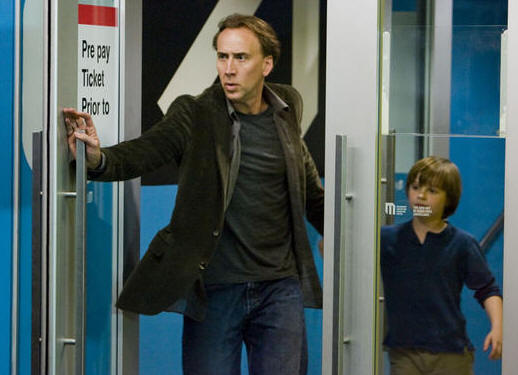 How did your relationship with your own son inform your relationship to
your character's son in the film?
How did your relationship with your own son inform your relationship to
your character's son in the film?
Well, I dedicated the movie to my first son, because that's what the
relationship was, really. It was me and him. I just have memories, and this
script came to me at the right time. I had the life experiences and the
emotional resources to play John Koestler. Indeed, some of the lines in the
scenes came from direct memories of my times with Weston [Coppola Cage]. I
had been looking for a way to express those feelings for a long time. Having
been a single father, a single father out in California, I know that there
is a gender bias, depending on which lawyer or which psychologist or family
therapist that you talk to. It's like there's a full moon out if a father
wants to see his son. That's just not true. Just because you're a man
doesn't mean that you can't raise your kid. I think that families should
stay together, but if you are a single father don't give up no matter what
they say. So I wanted to have a chance to express that, to show that
archetype in a movie: that you can have a devoted, positive relationship
between that family, a father and a son as well.
Have you changed your approach to films since having another child? Did
you have any input into changing this film's script to a father and son?
Well, I
dedicated the movie to my first son because of those experiences that I had
with him as a single father. I don't want to repeat myself, but I don't
think that I would've been able to play the part twenty years ago. I think
that I needed to have those memories in order to play John Koestler.
Do you expect that you will have life-changing experiences while making a
movie? Do films change your life in that way?
The making of movies? Certainly they can. Anything is possible. Just the
other day I was invited to go down to the subway rails and to be two foot
from a whooshing subway train because I had to pass getting a certificate
for subway rail safety. I never would've been in that situation before if I
wasn't making movies. It was dangerous, but at the same time it was
fascinating and got me thinking about the third rail, the awesome third
rail. One of the great bonuses of being a film actor is that I get to go to
different places, meet inspiring people and learn different things. So… all
those details add up.
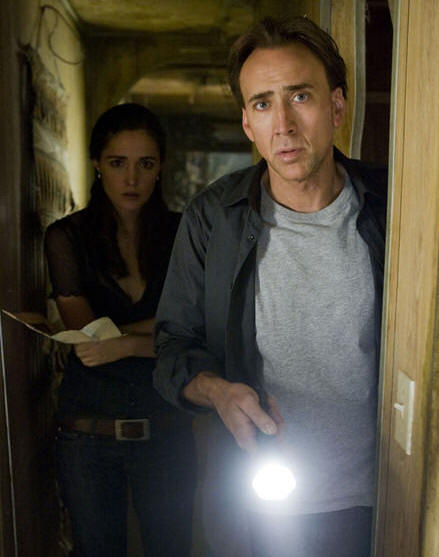 How do you think you would handle the gift of knowing the future?
How do you think you would handle the gift of knowing the future?
I think that for me, I would want to know when it came to my children, if
there was a way that I could prevent something. I don't think there's
anything that would take over my parental survival instincts, but other than
that, I like surprises. I think that if we knew everything that was going to
happen it would be very, very boring.
Have you ever had a sense of knowing, of an inclination that came true?
Yes, I think we all have. It's a part of being human, having those
experiences – call it what you want, déjà vu, or whatever. You can explain
it away with science, or you can explain it with something perhaps more
paranormal, but I think they're still talking about the same thing.
Anything that unsettled you?
Nothing that I would share with you, but it is all semantics. I mean, if you
tell me there's no such thing as a sea monster, I'll show you a white shark.
It's all semantics, in my opinion.
Your dad, August Coppola, was outside the rest of the acting Coppolas
since he was a Comparative Literature professor. What happens when there is
that break in a career-oriented family?
Well, my father is the oldest of the three children. Carmine, my
grandfather, came to America and it was really because of his skills as a
flautist – he was a first chair flautist for Toscanini – that we kind of
came out of, I mean really, an almost poverty-like situation. It was the
arts that did that. My father, who was being groomed to be a medical doctor,
always had an interest in books. He was just interested in literature and
philosophy and that was his calling. That was before Francis decided that he
was going to be a filmmaker. My father already went on his
philosophical and literary path. That was a train that wasn't going to stop
– nor did he want it to stop. I'm happy to say that he's quite happy now,
continuing to write his books. Then the others in the family have more or
less done directing, and I hope to see more music soon. I know that my son
is doing very well in the music industry right now. So we'll see what
happens there.
It's unusual to have a family tree that cuts across so many talented
generations. Do you ever wonder what it is about your family in that way?
I don't really spend a lot of time thinking about it, to be perfectly
honest. You can think about it. I'm not going to think about it [laughs].
Have your children ever expressed an interest in acting, and how would
you feel about that?
My oldest son, right now he's very immersed in his music, but there might be
a time when chooses to go into the cinema. My youngest son is three and a
half.
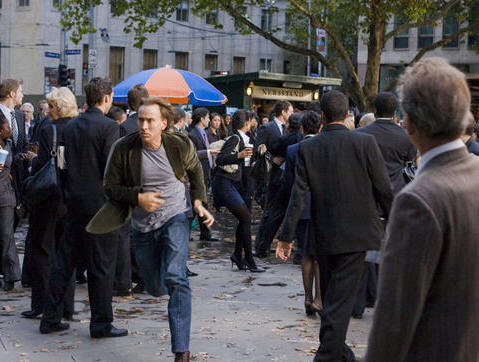 Do you have any aspirations to direct again in the future?
Do you have any aspirations to direct again in the future?
I wanted to direct again. I haven't had time, but I would like to. When you
direct you have to really devote a year of your life that project and so
it's not something that I can really do right now. But I will again at some
point.
Is there any particular genre of film that stretches your acting muscles
more than another, and is there a genre you'd like to do that you haven't
done yet?
I feel that I want to keep going in this science fiction and also perhaps
fantasy direction for a little while longer. I think there's some room for
growth there in my own abilities, in that I'll be a little more liberated
working on that landscape. So I'm happy to be here now. I don't know of any
other genres that I'm interested in. I like dramas, as you know. Comedies
not so much, only because I don't find the same
things funny that many other people seem to find funny. I don't really
respond to sex jokes and things like that. Some of my friends look at me and
go, “Come on, Nic. That was my best joke. Why aren't you laughing?” I go, “I
really don't know why I'm not laughing. I'm sort of out of sync with it.” So
I'd have to find something that was really about weird human behavior for me
to laugh [laughs].
Which one of your earlier roles still resonates for you on a second
viewing?
I don't really watch my movies again, but I can speak by the echo of it. I
would say that Wild at Heart and Vampire's Kiss had more of
that kind of energy to it. That's not to say that I can't still get kind of
punk rock or angry, but I just think that I'm doing it for different reasons
now.
Where does your energy and passion for acting come from?
It changed. In the beginning it came from an almost punk rock need to
express a lot of anger wherever that may have come from. As I got older, it
became or is coming more from a place of wanting to use the craft to help
others in some way, to hold a mirror up to the situations that we're going
through, to actually be more cautious about the way that I use the power of
film and to see if there's anything that I can do in the performances that
will resonate in the public a similar string that's on people's minds and is
on my mind. That way we have that relationship.
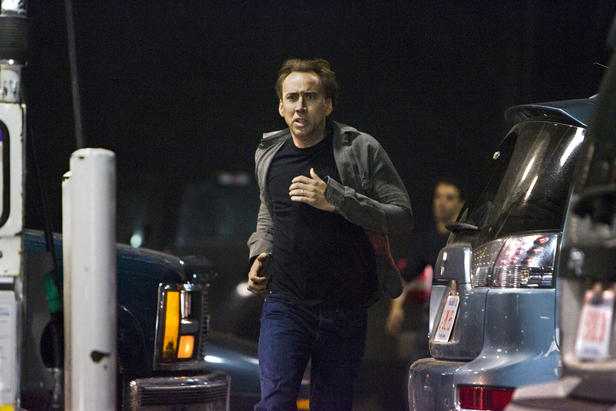 With this February being the best box office for a February in history,
what role is Hollywood playing, given the current economic climate?
With this February being the best box office for a February in history,
what role is Hollywood playing, given the current economic climate?
Well, more than ever, movies reveal themselves as healing, as helpful, as
encouraging, as escapist – anything that makes someone get through their day
in these times. It's the best form of entertainment, and it's still arguably
the most inexpensive form of entertainment. I always say to myself that if I
can make a movie that makes a kid smile or gives them some hope or something
to get excited about, then I'm applying myself in the best way that I can. I
don't think that just goes for kids. I think that it goes for adults as well
and for families. So there is a need to go to the movies and just shut your
mind off from the problems that are happening in our daily lives, the
stresses between countries, the economy and global warming – all of those
things that are on our minds. But at the same time, I think that movies can
help guide us through those experiences. I think all art tries to grapple
with, redefine, come to terms with and express what's happening now when
it's working. You can be entertained, but you can also be stimulated to
think about things. Knowing is one of those movies where you're going
to get the spectacle and have the entertainment in the grand science fiction
tradition. But also it will perhaps stimulate some discussion, to help you
sort out on your own where you might chose to go in terms of your own needs.
Now, I say that without preaching. It's up to you [as to] what you get from
the movie.
Email
us Let us
know what you
think.
Features
Return to the features page.